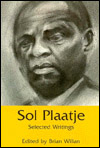South African Literature

PAGE 3
Mhudi
By Sol T. Plaatje
Mhudi (pronounced Moody), published in 1930 but written ten years earlier, is the first novel published by an African South African. Its importance and its quiet power have only been generally recognized in the last thirty years. Plaatje was a journalist, diarist, linguist, translator of Shakespeare, and political activist who had traveled to Britain, the US and Canada to plead the cause of black South Africans. His harrowing Native Life in South Africa, published in London in 1916, is in some respects a forerunner of Cry, the Beloved Country.
But Mhudi makes the case for tolerance, multicultural empathy, and the recognition of human dignity and feeling in a subtle way through an epic historical tale, set in the north of the country in the 1830s. One African group—the Barolong, is attacked by another, the Ndebele—under the warlike Mzilikazi. The peace-loving Barolong, are assisted by the white Boers, some of whom, however, also have their own agenda. The central figures are the attractive and spirited Mhudi and her husband Ra-Thaga, but we are invited to experience from within a wide range of characters from various backgrounds. Plaatje is even interested in the reactions of animals.
In its dramatic ebb and flow, which combines African and Western narrative traditions, the novel confronts us with issues of innocence and experience, war and peace, courage and tenderness, revenge and jealousy, actions and their repercussions, prejudice and open-mindedness, and cultural misunderstandings and potential harmonies.
Return to South Africa's bookshelf.
By Sol T. Plaatje
Mhudi (pronounced Moody), published in 1930 but written ten years earlier, is the first novel published by an African South African. Its importance and its quiet power have only been generally recognized in the last thirty years. Plaatje was a journalist, diarist, linguist, translator of Shakespeare, and political activist who had traveled to Britain, the US and Canada to plead the cause of black South Africans. His harrowing Native Life in South Africa, published in London in 1916, is in some respects a forerunner of Cry, the Beloved Country.
But Mhudi makes the case for tolerance, multicultural empathy, and the recognition of human dignity and feeling in a subtle way through an epic historical tale, set in the north of the country in the 1830s. One African group—the Barolong, is attacked by another, the Ndebele—under the warlike Mzilikazi. The peace-loving Barolong, are assisted by the white Boers, some of whom, however, also have their own agenda. The central figures are the attractive and spirited Mhudi and her husband Ra-Thaga, but we are invited to experience from within a wide range of characters from various backgrounds. Plaatje is even interested in the reactions of animals.
In its dramatic ebb and flow, which combines African and Western narrative traditions, the novel confronts us with issues of innocence and experience, war and peace, courage and tenderness, revenge and jealousy, actions and their repercussions, prejudice and open-mindedness, and cultural misunderstandings and potential harmonies.
Return to South Africa's bookshelf.



